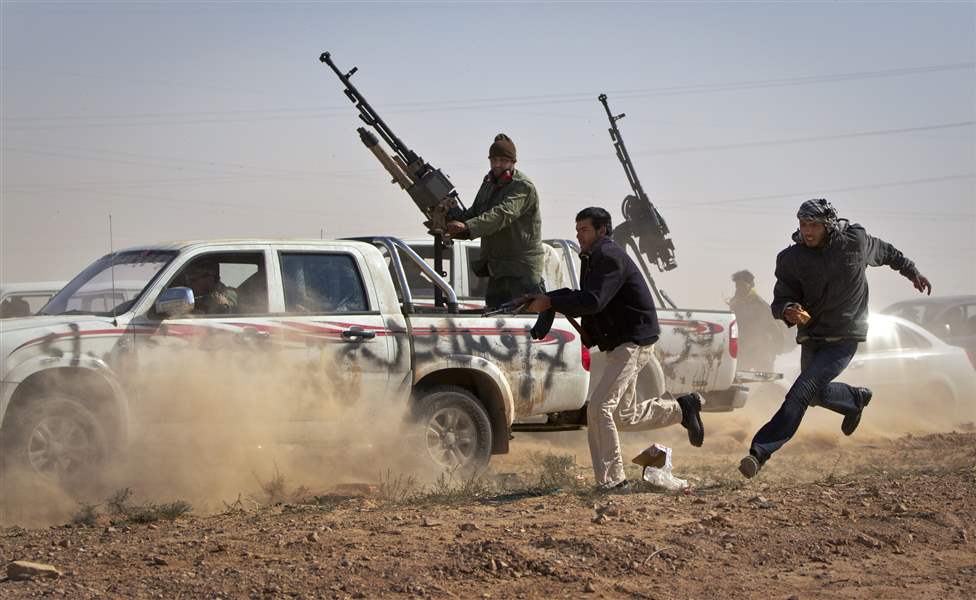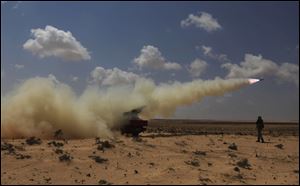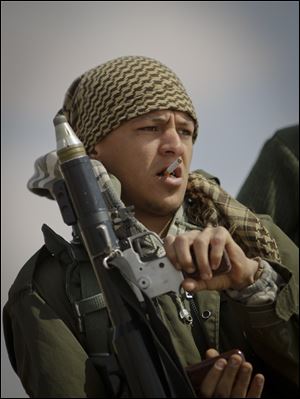
2 sons support plan for Gadhafi's ouster
Goal is to end battle, shift to democracy
4/4/2011
Libyan rebels use weapons attached to civilian vehicles to fight forces loyal to Libyan leader Moammar Gadhafi. A U.N.-mandated military intervention began March 19 to protect civilians.
ASSOCIATED PRESS

Rebels target positions held by Libyan leader Moammar Gadhafi's forces near the oil town of Brega.
The rebels challenging Gadhafi as well as the American and European powers supporting them with airstrikes have so far insisted on a more radical break with his more than 40 years of rule.
It is not clear whether Gadhafi, 68, has signed on to the reported proposal backed by his sons, Seif and Saadi, although one person close to the sons said the father appeared willing to go along.
Stripped of one of his closest advisers by the defection of Foreign Minister Moussa Koussa and isolated by decades of attempted coups and internal purges, Gadhafi is leaning on his sons as trusted aides and military commanders. He has seven sons.
The idea also reflects longstanding differences among his sons.
While Seif and Saadi have leaned toward Western style economic and political openings, Gadhafi's sons Khamis and Mutuassim are considered hard-liners. Khamis leads a fearsome militia focused on repressing unrest.
And Mutuassim, a national security adviser who also commands his own militia, has been considered a rival to Seif in the competition to succeed their father.
But Saadi, who has drifted through careers as a professional soccer player, a military officer, and a businessman, firmly backs the plan, an associate said.
The two sons "want to move toward change for the country" without their father, one person close to the Seif and Saadi camp said on condition of anonymity.
The proposals represent the latest sign that the Gadhafi government may be feeling the pressure from two weeks of allied airstrikes that have diminished the advantage in equipment of the Gadhafi forces.
Meanwhile, a senior Libyan official arrived in Greece on Sunday for talks about a potential resolution to the conflict, the Reuters news service reported.
Libyan Deputy Foreign Minister Abdelati Obeidi flew to Athens carrying a personal message from Gadhafi to Greek Prime Minister George Papandreou that Libya wanted the fighting to end, a Greek government official said.
"It seems that the Libyan authorities are seeking a solution," Foreign Minister Dimitris Droutsas said.
But there was no indication on what Tripoli might be ready to offer — beyond a willingness to negotiate — to end a war that has become bogged down on a frontline in the eastern oil town of Brega, while leaving civilians trapped by Gadhafi's forces in the west.
In other developments, Mohamed Ismail, an aide to Seif, returned from a trip to London, where he presented the proposal for Seif to take over from his father, a Libyan official said.
A diplomat familiar with the proposal, however, said discussions remained in the initial stages.

An anti-government Libyan rebel holds a rocket propelled grenade launcher near Brega, Libya, where the battle lines changed only slightly on Sunday.
And the rebels, who have set up their own provisional government, continue to insist on the exit from power of Gadhafi and his sons.
"This is the beginning position of the opposition, and this is the beginning position of the Libyan government," the diplomat said. "But the bargaining has yet to commence."
Militarily, the rebellion remained locked in a stalemate Sunday.
On the eastern front, near Brega, the two sides fired rockets, mortars, and artillery against each other in a contest for the northern entrance of town. But the battle lines changed only slightly and neither side appeared to have a clear upper hand.
Underlining the plight of civilians in western Libya, a Turkish ship that sailed into the besieged city of Misrata to rescue about 250 wounded had to leave in a hurry after crowds pressed forward on the dockside hoping to escape.
"It's a very hard situation ... we had to leave early," said Turkish consular official Ali Akin after the ship stopped to pick up more wounded in the eastern rebel stronghold Benghazi.
Turkey's foreign minister ordered the ship into Misrata after it spent four days waiting in vain for permission to dock.
It arrived under cover from 10 Turkish air force F-16 fighter planes and two navy frigates, Mr. Akin said.
The U.N.-mandated military intervention that began March 19 was meant to protect civilians caught up in fighting between Gadhafi's forces and the rebels.
In other developments, the U.S. military agreed to NATO's request for a 48-hour extension of American participation in coalition airstrikes against targets in Libya.
The United States is shifting the combat role to Britain, France, and other NATO allies, but American air power is still in demand.
Air Force AC-130 gunships and A-10 Thunderbolts and Marine Corps AV-8B Harriers will continue to attack Gadhafi's troops and other sites through this evening.

Libyan rebels use weapons attached to civilian vehicles to fight forces loyal to Libyan leader Moammar Gadhafi. A U.N.-mandated military intervention began March 19 to protect civilians.
After Saturday, no U.S. combat aircraft were to fly strike missions over Libya unless NATO officials specifically asked and authorities in Washington gave their approval.
NATO assumed full control last week from the U.S.-led international force for all aspects of the operation in Libya as authorized by U.N. resolutions that include an arms embargo, enforcing the no-fly zone, and protecting civilians from Gadhafi's forces.
In an emailed statement, NATO spokesman Oana Lungescu said on Sunday that "poor weather conditions over the last few days" were the reason the alliance made the request.
"This is a short-term extension which expires [Monday]," she said.
In Washington on Sunday, U.S. lawmakers cautioned that the allies need to know more about the rebels in Libya before providing them with weapons.
Two weeks into the assault on Gadhafi, Republican lawmakers expressed concern that a stalemate could leave him in control of portions of Libya and with access to stockpiles of chemical weapons.
A decision yet to be made by the Obama Administration is whether to arm the rebels with the firepower they need to take and hold ground against Gadhafi's forces.
Rep. Mike Rogers (R., Mich.), chairman of the House Intelligence Committee, said there may be strains of al-Qaeda within the rebel ranks and that the coalition should proceed with caution before arming them.
"We know they're against Moammar Gadhafi remaining in power, but we don't know what they are for," Mr. Rogers said.
Senate Majority Leader Harry Reid advocated a "wait and see" approach to giving the opposition forces weapons.
"I think at this stage we really don't know who the leaders of this rebel group are," Mr. Reid (D., Nev.) said on CBS' Face the Nation.
Sen. Lindsey Graham (R., S.C.) said the coalition needs to take the air war to Libya's capital where Gadhafi and his inner circle are located.
Mr. Rogers also warned that if there were a stalemate in Libya, a cornered Gadhafi might resort to extreme measures against the opposition forces, such as the use of chemical weapons.
Mr. Rogers said he has been to Libya and seen Gadhafi's chemical weapons.
"I think you have to worry that he's a terrorist threat," Mr. Rogers said on NBC's Meet the Press.